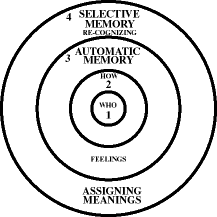

There is an important necessary distinction to make between experience and its interpretation, especially for anyone who wants to use a relationship as a means for changing self. It is difficult to distinguish between what is authentically the individual, as demonstrated by unique self-expression, and what is interpretation of this self-expression by others. (See Nigel Armistead reference)
Distortions, reactions, projections and misunderstandings become easily mistaken for characteristics of the individual, as others interpret the significance of available self-expressions. This phenomenon is what I call the "tyrrany of interpretation" because it is such a common problem in relationships. Harry Stack Sullivan reminded us in his writing that "You don't know what someone else's words mean, or what your words mean to them, until you find out; and most of the time we do not bother to find out."
People frequently confuse these two items:
(1.) the significance of others' perceptions of, and reactions to, them; and
(2.) their own responsibility for using "feedback" or others' reactions or self-expressions about what they have perceived.
The response of person A., and his or her perceptions of person B., are as much an accurate, valid and reliable expression of who A. is as they are an accurate representation of who B. might be. Therefore, if change in their relationship is to occur, they usually must both change in important ways, and one of those ways is how they think about themselves and what is important in their relationship.